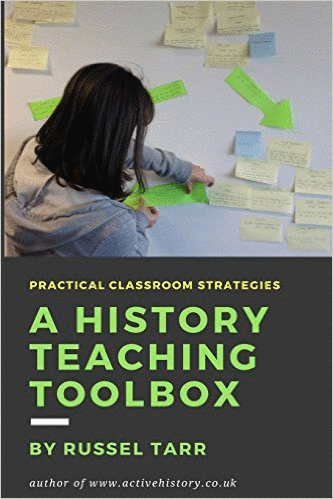Transform your history classroom
ActiveHistory provides educational, award-winning interactive simulations, decision-making games, self-marking quizzes, high-quality worksheets and detailed lesson plans for the school history classroom. All resources have been designed by full-time history teacher Russel Tarr.
An ActiveHistory subscription provides everything you need to construct and deliver a History course from start to finish for the entire 11-18 age range!
These consist not just of lesson plans, worksheets and teacher notes, but also multimedia lectures and interactive games and historical simulations ideal for remote learning and self-study.
World History teaching resources for the high school classroom: lesson plans, worksheets, quizzes and simulation games for KS3, IGCSE, IB and A-Level teachers.
D. To Persuade?
▪ History can also be used as a form of persuasion or propaganda. To justify present day values and policies, the past can either be demonised (“Victorian Britain was disgustingly racist, sexist and homophobic”) or idealised (“Victorian Britain was not afraid to stress its belief in community, family, authority and self-help”).
Method 1: Using history to oversimplify issues
▪ Those wishing to avoid or delay change will use history as nostalgia.
Details
▪ Those wishing to pursue or accelerate change will use history to stress how such developments are a long-term trend and nothing to be worried about.
Details
Method 2: Using history to complicate issues
▪ Too little history is a bad thing; but so is too much. History can be used to keep wounds open, to perpetuate the mistakes and prejudices of the past rather than move on from them.
Northern Ireland
Details
▪ The problems of Northern Ireland are difficult to solve because both sides are being crushed by their sense of history. Ancient religious differences between Irish Catholics and English Protestants lie at the root of the problem – but when did two people last come to blows over the nature of transubstantiation in the sacrament of the Eucharist? The subsequent (sometimes brutal) colonisation of Northern Ireland by Protestant English then feeds into the picture – William of Orange’s defeat of (Catholic) James II at the Battle of the Boyne in 1690 is still celebrated by “Orange Parades” each year which frequently flare into outright violence.
The Middle East
Details
▪ A similar situation exists in the Middle East. Most of us know there is a conflict between Israelis and Palestinians, but we find it difficult to understand the depth of the conflict: the Jewish people claim a right to live in Israel based on the fact they lived their almost 2000 years ago before being expelled by the Romans, since when they became people without a homeland, persecuted for centuries and most recently in the Holocaust. The Arabs contend that this is history being used for political purposes.
▪ The danger is that this “burden of history” can be used to justify a lack of change: these problems are clearly insoluble, so why bother even trying?
Memorial Days
Details
▪ There are now a whole range of “Memorial Days” on the calendar. They arguably create more confusion than they are worth. Read through the following and decide which purpose sounds most accurate for each of the examples.
| . | . | Possible Purpose 1 |
Possible Purpose 2 |
Armistice Day |
11 th November |
To honour the war dead and admire the sacrifices they made for their countries |
To pity the war dead and reflect on the utter futility of war |
Holocaust Memorial Day |
27 th January |
To reflect on the suffering of all victims of racial persecution |
To stress the unique suffering of Jews and therefore their right to be in Israel |
Slavery Memorial Day |
25 th March |
To celebrate the abolition of slavery in the British Empire |
To highlight the collective guilt of the British people for slavery and their obligation to compensate black people for it |
| < Prev | Next > |

© 1998-2025 Russel Tarr, ActiveHistory.co.uk Limited (Reg. 6111680)
1 Torrin Drive, Shrewsbury, Shropshire, SY3 6AW, England
Privacy Policy | Contact






